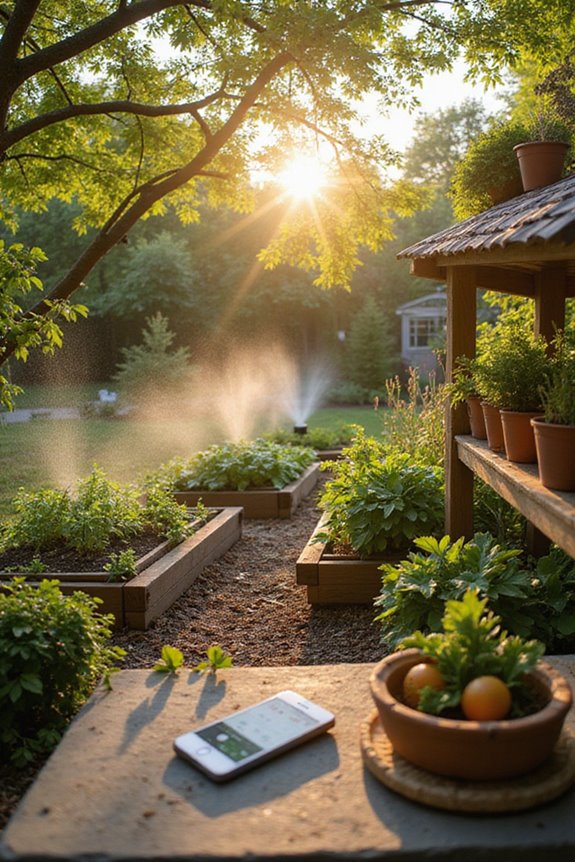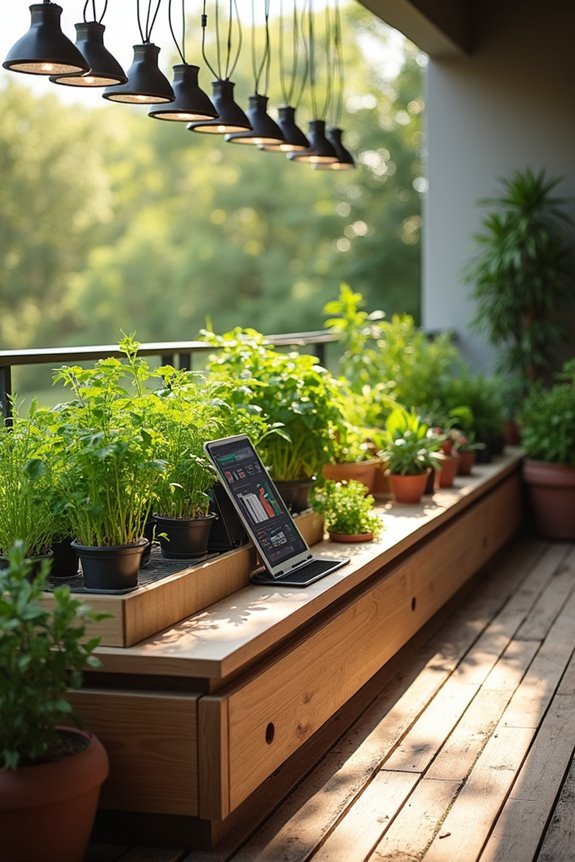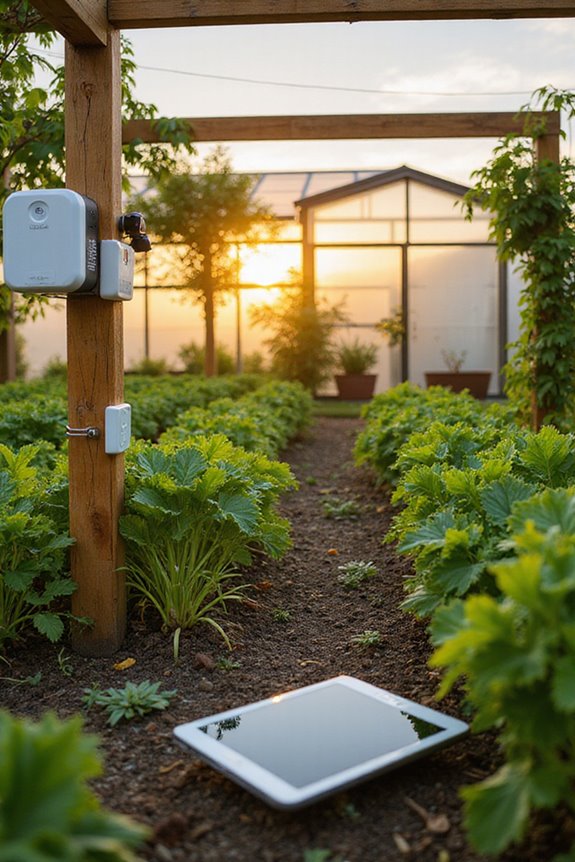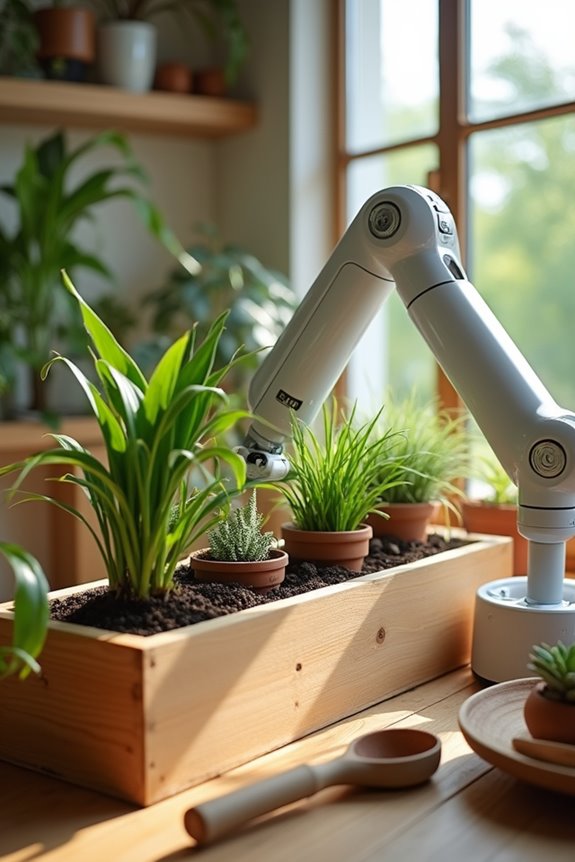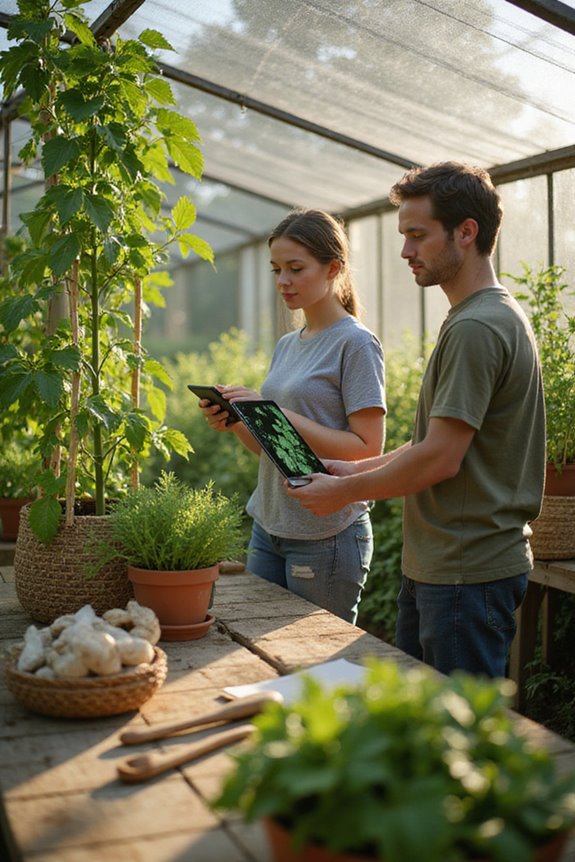Smart gardening offers several notable benefits that can enhance our gardening experience. First, it boosts efficiency with automated systems for watering and mowing, saving us time and effort. Second, it optimizes resources, conserving water with precision irrigation and improving soil health. Third, smart tools improve plant growth by monitoring soil conditions and light exposure. By adopting these practices, we can increase yields and promote sustainability. If you’re curious, there’s more we can explore about this innovative approach.
Key Takeaways
- Smart gardening enhances efficiency with automated systems for watering and mowing, saving time and promoting sustainable practices.
- Resource optimization through precision irrigation and smart nutrient management conserves water and protects the environment.
- Improved plant health is achieved with real-time monitoring of soil conditions, leading to better yields and vibrant plants.
- Accessibility features and adaptive technology support diverse gardeners, making gardening inclusive and reducing physical strain.
- Smart gardening fosters community engagement, enhances well-being, and provides access to fresh produce while promoting environmental stewardship.
Efficiency and Convenience
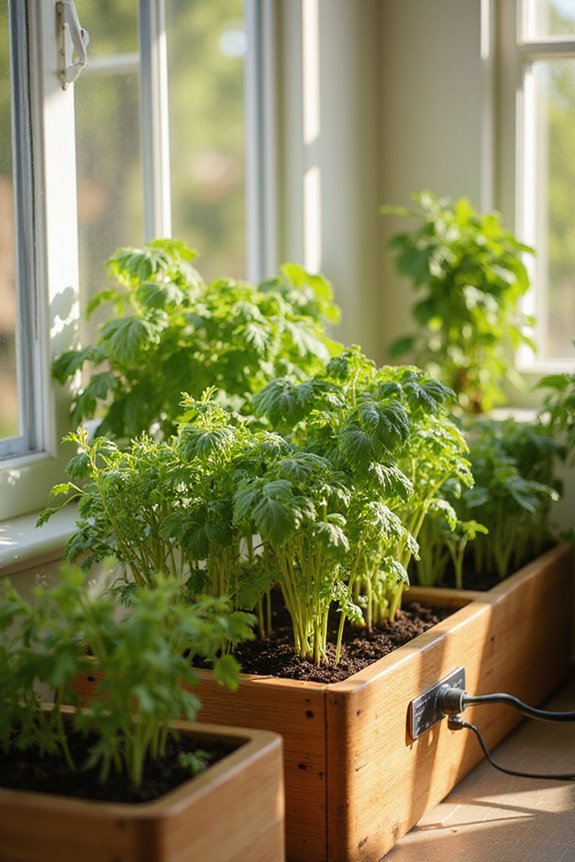
When we think about gardening, efficiency and convenience are key factors that can make the experience much more enjoyable. Automated scheduling, like watering systems that respond to soil moisture and weather, saves us time. Smart mowing devices cut grass on their own, allowing us to focus on other tasks.
With remote monitoring, we can check soil moisture and temperature from anywhere through smart gardening apps. This means we can manage our gardens without being physically present. Alerts notify us of any plant stress or system issues, ensuring timely intervention. Additionally, automated watering systems optimize water usage and contribute to sustainable gardening practices.
Resource Optimization and Sustainability
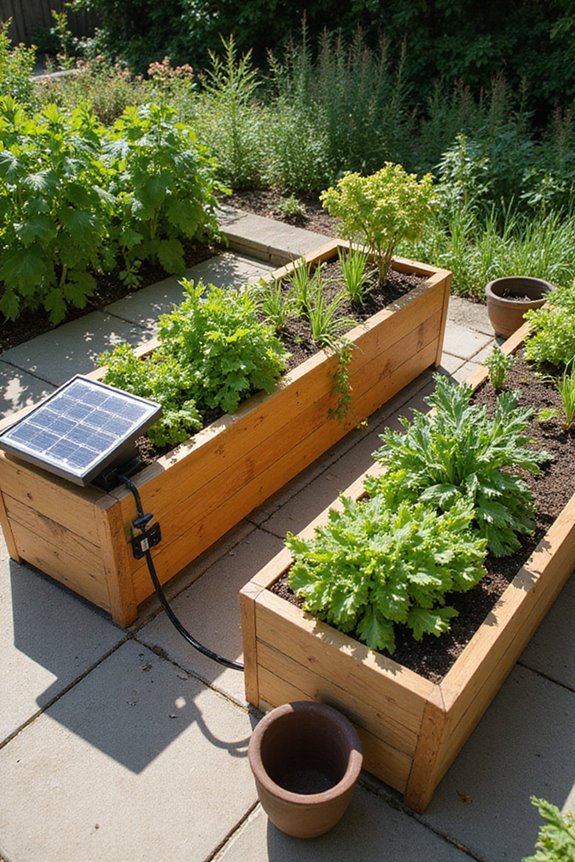
Resource optimization and sustainability are essential aspects of smart gardening that can benefit both us and the environment. By using data analysis, smart gardening technology helps us manage resources more effectively. For instance, precision irrigation systems utilize soil moisture sensors to water only when necessary, achieving up to 85% water conservation. Additionally, smart nutrient management devices provide real-time feedback on soil health, preventing over-fertilization. This minimizes waste and protects our waterways. Implementing drought-resistant species can further enhance water efficiency while ensuring vibrant plant growth. We can also reduce our carbon footprint through energy-efficient climate control systems that adjust conditions based on plant needs. Together, these practices support healthier urban green spaces while promoting biodiversity. Ultimately, smart gardening fosters a more sustainable future for our communities.
Improved Plant Health and Growth
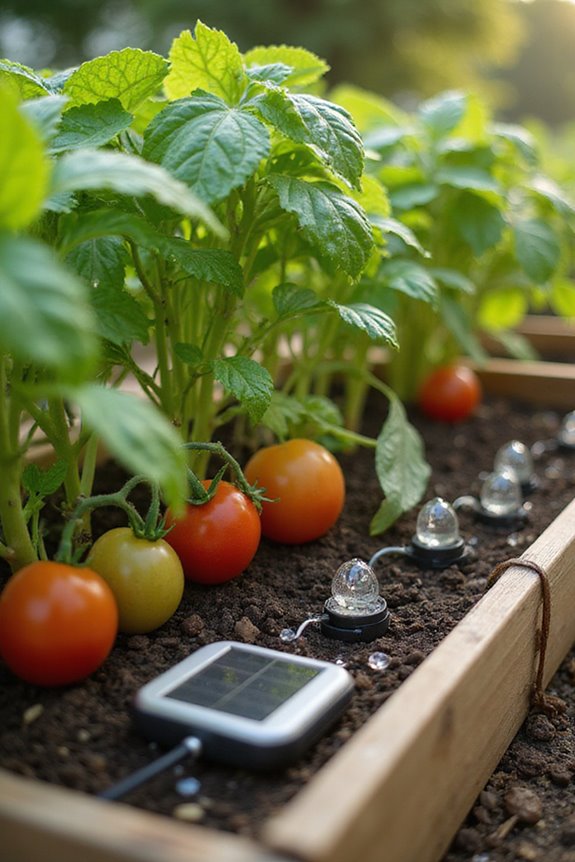
Improved plant health and growth are achievable through the integration of smart gardening technology. By utilizing soil monitoring tools, we can access real-time data on moisture levels, nutrient content, and pH. This helps us prevent overwatering and guarantees our plants receive timely fertilization.
Light management is equally essential. Smart tools measure light intensity and duration, allowing us to optimize plant placement and use artificial lights when necessary. This prevents damage from inadequate or excessive sunlight, promoting healthier foliage and stronger growth.
Together, these technologies enhance our gardening experience. They help us cultivate a thriving garden, leading to better yields and more vibrant plants. By embracing smart gardening, we foster a community of informed and empowered gardeners. Additionally, smart watering systems optimize hydration based on real-time data, significantly reducing water waste compared to traditional methods.
Accessibility and Inclusivity
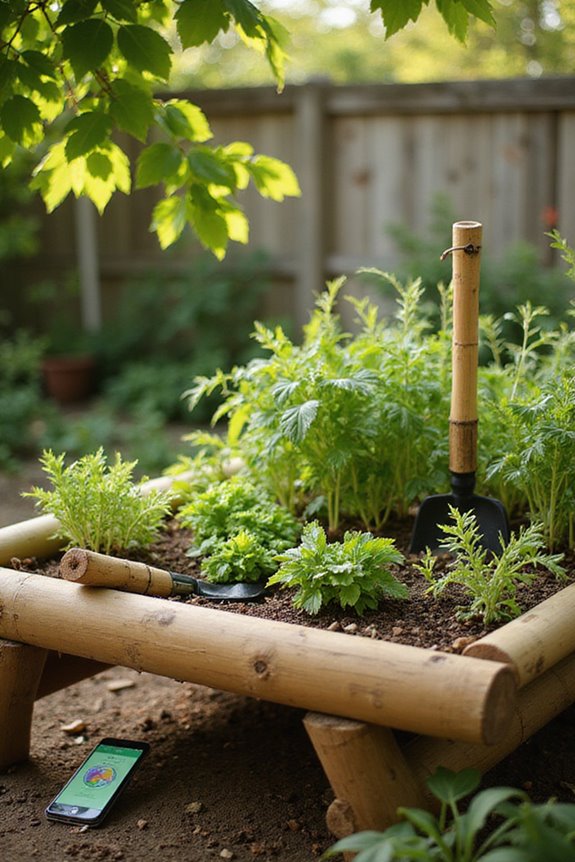
Smart gardening technology not only enhances plant health but also opens doors for a wider range of individuals to engage in gardening.
- Enhanced Accessibility: Adaptive technology, like automated watering systems, reduces the physical strain for those with mobility issues. Remote management through smartphone apps allows us to maintain our gardens from anywhere.
- Support for New Gardeners: Intuitive platforms provide guided instructions, making gardening approachable for beginners. AI recommendations cater to our local conditions, boosting confidence.
- Community Connectivity: Smart gardens encourage collaboration, allowing us to share resources easily. Accessible garden spaces invite participation across diverse backgrounds and abilities.
Increased Yield and Food Security
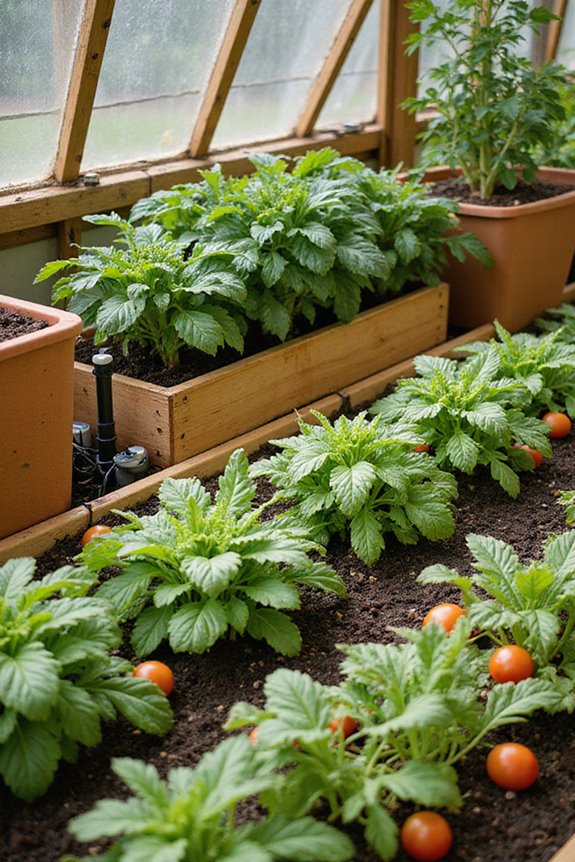
Increased crop yields and food security are essential for addressing the growing demands of our population. Smart gardening techniques, like hydroponics, can boost yields by up to 20 times per acre compared to traditional farming. These systems allow for year-round production, ensuring a constant supply of diverse crops, including tomatoes and leafy greens.
- Crop Diversification: With controlled environments, we can grow a variety of crops, enhancing our diets and market stability. Additionally, hydroponic growing systems provide an efficient way to cultivate plants, maximizing space and resources.
- Climate Resilience: Smart gardens thrive regardless of outdoor weather, reducing the risk of crop failure from climate events.
Economic Impact
The economic impact of smart gardening is becoming increasingly significant as we embrace modern agricultural practices. This sector is experiencing remarkable market growth. For instance, the smart indoor gardens market is projected to double, reaching USD 284.8 million by 2033. With urbanization driving demand, smart gardening tools are becoming essential for city dwellers.
Additionally, smart gardening fosters job creation. As this industry expands, it supports high-tech manufacturing and software development jobs. Innovations in AI and eco-friendly products are making businesses competitive and attracting investment.
Together, these factors illustrate how smart gardening can enhance our economy while catering to our needs for efficient, sustainable solutions in our growing urban environments.
Environmental Impact
As we explore the environmental impact of gardening technology, we see numerous benefits that contribute to sustainability. Smart gardening practices enhance water conservation by using up to 50% less water than traditional methods. Automated systems adjust irrigation based on real-time soil moisture data, preventing overwatering and runoff.
Additionally, these technologies promote soil health. By minimizing soil disturbance and enhancing nutrient management, we can foster long-term soil fertility and support beneficial microbes. Practices like no-till gardening help sequester carbon, reducing greenhouse gas emissions.
Together, these smart solutions not only conserve water but also improve soil health, creating a healthier ecosystem. Embracing smart gardening means we’re making a positive impact on our environment while nurturing our gardens.
Time Management Benefits
Smart gardening offers us valuable time management benefits that can transform how we care for our gardens. With schedule automation, we can set watering and feeding schedules that adjust automatically based on real-time conditions. This means we spend less time manually checking our plants.
- Task Prioritization: Smart systems help us prioritize essential tasks, ensuring we focus on what matters most.
- Real-Time Monitoring: Continuous monitoring reduces the need for frequent inspections, saving us time.
- Convenience: Remote access through apps allows us to manage our gardens from anywhere, minimizing on-site visits.
Enhanced Gardening Experience
Gardening can become a more fulfilling experience when we leverage technology to enhance our environment. With smart technology, we can optimize plant growth conditions by adjusting light, water, and temperature to suit specific needs. This leads to healthier plants and improved yields.
We also benefit from enhanced monitoring. Real-time data on soil moisture and nutrient levels keeps us informed, allowing for timely interventions. Alerts notify us of maintenance tasks or potential issues.
Additionally, smart gardens create a calming atmosphere with gentle lighting and natural sounds. Automation reduces manual labor, making gardening accessible for everyone. Together, we can enjoy the aesthetics of gardening while easing the burden of care, fostering a sense of belonging in our green spaces.
Frequently Asked Questions
How Can Smart Gardening Help in Pest Management?
Smart gardening enhances our pest management through advanced pest detection and monitoring. By using organic solutions, we can minimize chemical use, ensuring healthier plants and a thriving ecosystem that we all can enjoy together.
What Types of Plants Benefit Most From Smart Gardening?
When we think about plant care, indoor and outdoor plants thrive with smart gardening. Together, we can nurture vibrant greenery, optimize growth, and create a shared passion for thriving ecosystems that connect us all.
Can Smart Gardening Systems Work Outdoors as Well as Indoors?
Can smart gardening systems work outdoors as well as indoors? We believe outdoor automation can enhance our gardening experience, but climate adaptation is essential for success. Together, let’s explore the possibilities of smart gardening in diverse environments.
What Is the Initial Cost of Setting up Smart Gardening Systems?
When we consider the initial investment for smart gardening, a careful cost analysis reveals systems range from $250 to $1,500. Together, we can explore options that suit our space and budget beautifully!
How Do Smart Gardening Technologies Integrate With Existing Gardening Tools?
We’ve found that smart gardening technologies enhance our experience through sensor integration and tool compatibility, seamlessly connecting our existing gardening tools. This integration empowers us to manage our gardens more efficiently and effectively together.

